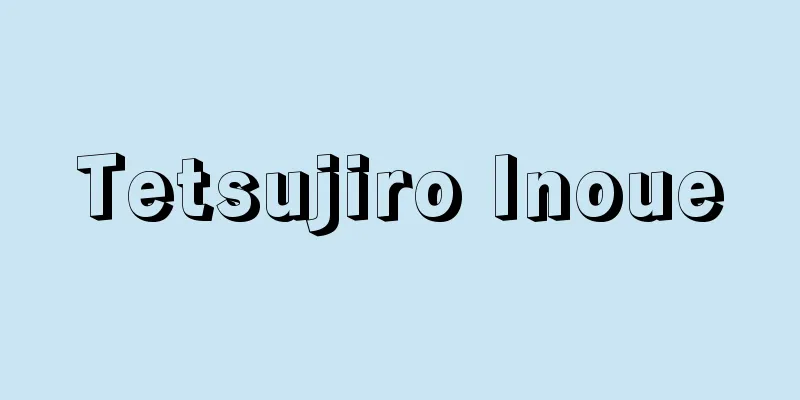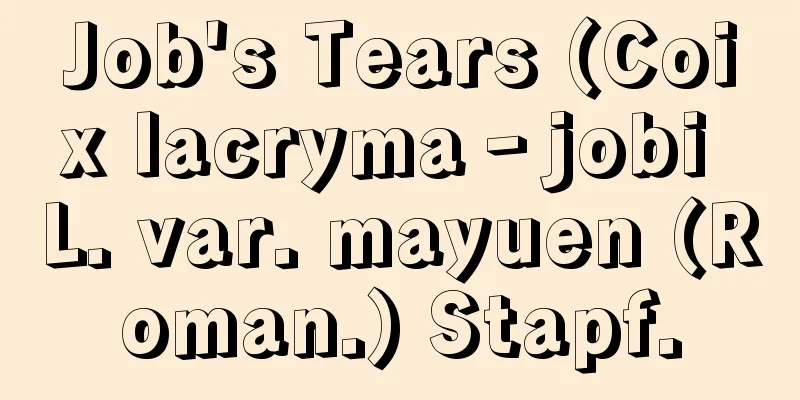Tetsujiro Inoue

|
A philosopher of the Meiji and Taisho periods. Born on December 25, 1852, in Dazaifu, Chikuzen Province (Fukuoka Prefecture), as the third son of the physician Funakoshi Shuntatsu. He initially studied Confucianism under Nakamura Tokuzan, but in 1868 (Meiji 1) he went to Hakata to study English, and in 1871 entered the Kounkan in Nagasaki to study Western studies. In 1875 he was selected to enter Kaisei School in Tokyo, and in 1877 he became one of the first students to enter the University of Tokyo, majoring in philosophy. In 1878 he was adopted by Inoue Tetsuei (1826-1906). Inoue graduated from the University of Tokyo in 1880. After that, he published the "Journal of Oriental Arts" (1881) with Sugiura Shigetake and others, compiled Japan's first philosophical dictionary "Tetsugaku Jiji" (1881), translated Alexander Bain's (1818-1903) "Shinsho Shinsetsu" (1882), and published "Shinsho Shinsetsu" and "Sokutetsu Tetsugaku" (Lectures on Western Philosophy) (both in 1883). In particular, "Shinsho Shinsetsu" is a development of Inoue's own philosophical system, and shows his strong desire for a philosophical system by stating, "If I am like you, as a man who already desires the talent of a philosopher, I must necessarily study the roots of ethics." During that time, he worked as an assistant professor at the University of Tokyo, compiling the history of Eastern philosophy. On the other hand, he published "Shintaisho" (New Style Poetry Collection) with Toyama Masakazu and Yatabe Ryokichi, and as a pioneer of the new style poetry movement, he worked to introduce and promote poetry. In 1884, he went to Germany to study philosophy, where he studied under Kuno Fischer and W. Bundt, among others, and began to seriously study German idealist philosophy. In 1890, he returned to Japan and was appointed the first Japanese to be appointed professor of philosophy. That same year, the Imperial Rescript on Education was issued, and the following year, in 1891, Inoue published a commentary on it, The Imperial Rescript: An Explanation. In 1893, he published The Conflict of Education and Religion, which took up the Uchimura Kanzo disrespect incident and other cases, harshly criticizing Christianity as an anti-national religion, saying, "In short, Christianity is a religion that has never been suited to our country." Inoue's philosophical system is called "phenomenon is realism," and its most complete description is shown in "The Relationship between Recognition and Reality" (1900). It remains an eclecticism that holds that "subjectivity" and "objectivity" are two aspects of "reality." Ultimately, Inoue's true talents lie in his research into early modern Confucianism, such as in "The Philosophy of the Japanese Yangming School" (1900), and in his foundations for national morality in the imperial state, such as in "An Outline of National Morality" (1912). His books are kept in the "Inoue Library" at the Tokyo Metropolitan Central Library. [Kazunori Watanabe, August 19, 2016] "Shinichi Funayama, "Research on the History of Meiji Philosophy" (1959, Minerva Shobo)" " Kazunori Watanabe, "History of Meiji Thought" (1978, Pelican Publishing)" [References] | | | | | | |©Shogakukan Library "> Tetsujiro Inoue Source: Shogakukan Encyclopedia Nipponica About Encyclopedia Nipponica Information | Legend |
|
明治・大正期の哲学者。安政(あんせい)2年12月25日、筑前国(ちくぜんのくに)(福岡県)太宰府(だざいふ)に、医師船越俊達(ふなこししゅんたつ)の三男として生まれる。初め中村徳山(なかむらとくざん)に就いて儒教を学んだが、1868年(明治1)博多(はかた)に出て英語を学び、さらに1871年長崎の広運館に入り西洋学を修めた。1875年とくに選抜されて東京の開成学校に入学、1877年東京大学の1期生として哲学を専攻した。1878年井上鉄英(てつえい)(1826―1906)の養子となった。 1880年東京大学を卒業。以後、『東洋学芸雑誌』(1881)を杉浦重剛(すぎうらしげたけ)らと発刊し、日本最初の哲学辞典『哲学字彙(じい)』(1881)の編纂(へんさん)、ベインAlexander Bain(1818―1903)の『心理新説』(1882)の翻訳、『倫理新説』『西洋哲学講義』(ともに1883)の刊行など目覚ましく活動した。とりわけ『倫理新説』は、井上が自らの哲学体系を展開したもので、「余ガ如(ごと)キハ、既(すで)ニ哲学士タラント欲スル者ナレバ、必ズヤ倫理ノ大本ヲ講究セザルベカラズ」と述べて哲学体系への強烈な志向を示している。その間、東京大学助教授として東洋哲学史の編纂に従事した。また一方では、外山正一(とやままさかず)、矢田部良吉(やたべりょうきち)らと『新体詩抄』を出版し、新体詩運動の先駆として、ポエトリpoetryの移入紹介に努めた。 1884年哲学修業のためドイツに留学、クーノー・フィッシャー、W・ブントなどに就学、ドイツ観念論哲学を本格的に研究した。1890年帰朝、日本人として最初の哲学教授に任ぜられた。この年「教育勅語」が渙発(かんぱつ)され、翌1891年井上は政府の意を受けてその解説書『勅語衍義(えんぎ)』を出版した。さらに1893年『教育と宗教の衝突』を刊行し、内村鑑三(うちむらかんぞう)不敬事件などを取り上げ、「要するに、耶蘇(ヤソ)教は元(も)と我邦(わがくに)に適合せざるの教なり」とキリスト教を反国体的宗教として激しく批判した。 井上の哲学体系は「現象即実在論」とよばれ、そのもっとも完成した叙述は「認識と実在との関係」(1900)に示されている。それは、「主観」と「客観」は「実在」の両側面であるとする折衷主義にとどまっている。結局、井上の本領は、『日本陽明学派之哲学』(1900)などの近世儒教研究と、『国民道徳概論』(1912)などの天皇制国家における国民道徳の基礎づけに求められよう。東京都立中央図書館に「井上文庫」として蔵書が収められている。 [渡辺和靖 2016年8月19日] 『船山信一著『増補明治哲学史研究』(1959・ミネルヴァ書房)』▽『渡辺和靖著『明治思想史』(1978・ぺりかん社)』 [参照項目] | | | | | | |©小学館ライブラリー"> 井上哲次郎 出典 小学館 日本大百科全書(ニッポニカ)日本大百科全書(ニッポニカ)について 情報 | 凡例 |
Recommend
"Theory of Conic Sections"
…Apollonius was born in Perga, a small city in As...
Ogawa Hanbei
?-? A Joruri composer from the mid-Edo period. He...
Aratohibin - Aratohibin
…The secretory activity of the corpus allata is r...
Motor units
…In the case of a weak contraction, only a small ...
The soushi faction (English spelling)
A Chinese abbreviation of "the faction of rea...
Mathematical table
A table of values of function f ( x ) correspond...
α-Hydroxypropionic acid
...The chemical formula is CH 3 CH(OH)COOH. It is...
Francisco de Zurbarán
A master of Spanish painting in the 17th century....
Eugène Freyssinet
French structural engineer. Born in Auberge, Fran...
Pathography
Pathography: A psychiatric study of the relationsh...
Eroica
...Although it is generally believed that the Fir...
Banba Post Station
A post station in Sakata County, Omi Province. It ...
melinite (English spelling)
…The ingredients were shrouded in mystery for a l...
Pendular nystagmus (English spelling) Pendular nystagmus
…It usually occurs involuntarily and cannot be st...
Yellow-spotted snapper - Yellow-spotted snapper
A general term for marine fishes belonging to the ...









